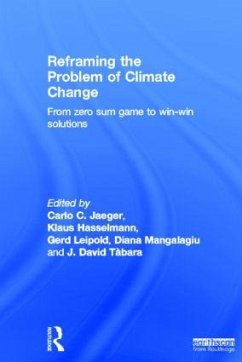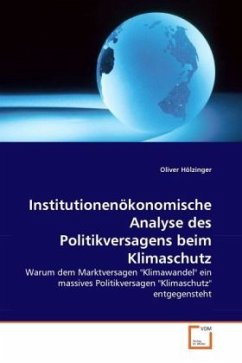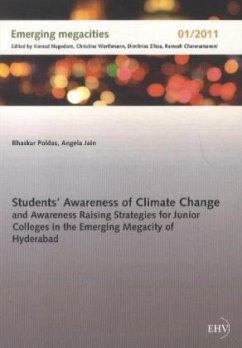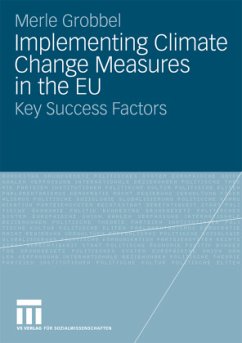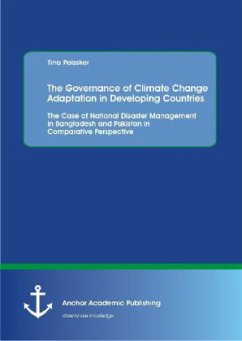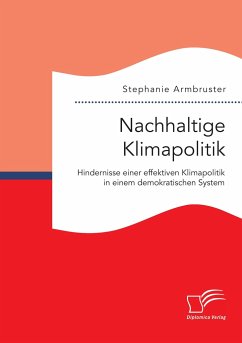
The International Climate Regime and its Driving-Forces: Obstacles and Chances on the Way to a Global Response to the Problem of Climate Change

PAYBACK Punkte
0 °P sammeln!
The greenhouse effect is a vital process which is responsible for the heat on the earth s surface. By consuming fossil fuels, clearing forests etc. humans aggravate this natural process. As additionally trapped heat exceeds the earth s intake capacity this consequently leads to global warming. The current concentration of CO2 in the atmosphere is already 30% higher compared to pre-industrial levels and unmanaged this development is likely to result in an increase of up to 6.4° C towards the end of the century. Especially the poorest regions of the world are facing a double inequity as they a)...
The greenhouse effect is a vital process which is responsible for the heat on the earth s surface. By consuming fossil fuels, clearing forests etc. humans aggravate this natural process. As additionally trapped heat exceeds the earth s intake capacity this consequently leads to global warming. The current concentration of CO2 in the atmosphere is already 30% higher compared to pre-industrial levels and unmanaged this development is likely to result in an increase of up to 6.4° C towards the end of the century. Especially the poorest regions of the world are facing a double inequity as they a) will be hit earliest and hardest by the adverse impacts of climate change, and b) are least responsible for the stock of current concentrations in the atmosphere. Seeing this the application of the precautionary principle telling us to better be safe than sorry appears to be imperative and makes traditional cost-benefit analysis become obsolete. Thus combating global warming has become one of the most important issues facing the world in the 21st century.
The international climate regime is the main platform to further cooperation between nations and to tackle this problem. Since the first world climate conference in 1979 the international community of states pursues the goal of stabilizing greenhouse gas emissions. In 2009, the 15th COP of the UNFCCC aimed at achieving the final breakthrough with regard to framing new long-term mitigation commitments.
However, the regime theory tells us that states behave as rational egoists and solely follow selfishly defined interests to maximize own profits. So it not only has to be assumed that just states with a favourable benefit-cost ratio will take the role of a pusher in international climate negotiations but also that powerful states are more likely to reach a favourable outcome. Indeed the highly ineffective Kyoto Protocol, which amongst others had to deal with the exit of the United States, the creation of hot air reductions and an overall lack of compliance incentives, has already shown the difficulties of creating an effective climate regime. In Copenhagen it became obvious that influential actors still do not seem to have an interest to significantly change their energy consumption patterns in order to reduce emissions. The majority of developing countries, politically prioritize the protection of their economic development which heavily depends on the use of cheap energy from fossil fuels. Especially China by no means intends to cut its impressive GDP growth figures to please international crowds. Meanwhile the hands of the US President on the international stage were once again tied by domestic restrictions. However, although it seemed that the long prevailing differences of interests between industrial and developing countries are more than ever insuperable, there is hope. A global race towards renewable energy and related jobs has already started. Nations and international corporations are positioning themselves to take advantage of the inevitable transition from fossil fuels to renewable energy sources. This could be the starting point for a sustainable bottom-up policy architecture on the international level replacing the current top-down approach.
The international climate regime is the main platform to further cooperation between nations and to tackle this problem. Since the first world climate conference in 1979 the international community of states pursues the goal of stabilizing greenhouse gas emissions. In 2009, the 15th COP of the UNFCCC aimed at achieving the final breakthrough with regard to framing new long-term mitigation commitments.
However, the regime theory tells us that states behave as rational egoists and solely follow selfishly defined interests to maximize own profits. So it not only has to be assumed that just states with a favourable benefit-cost ratio will take the role of a pusher in international climate negotiations but also that powerful states are more likely to reach a favourable outcome. Indeed the highly ineffective Kyoto Protocol, which amongst others had to deal with the exit of the United States, the creation of hot air reductions and an overall lack of compliance incentives, has already shown the difficulties of creating an effective climate regime. In Copenhagen it became obvious that influential actors still do not seem to have an interest to significantly change their energy consumption patterns in order to reduce emissions. The majority of developing countries, politically prioritize the protection of their economic development which heavily depends on the use of cheap energy from fossil fuels. Especially China by no means intends to cut its impressive GDP growth figures to please international crowds. Meanwhile the hands of the US President on the international stage were once again tied by domestic restrictions. However, although it seemed that the long prevailing differences of interests between industrial and developing countries are more than ever insuperable, there is hope. A global race towards renewable energy and related jobs has already started. Nations and international corporations are positioning themselves to take advantage of the inevitable transition from fossil fuels to renewable energy sources. This could be the starting point for a sustainable bottom-up policy architecture on the international level replacing the current top-down approach.





